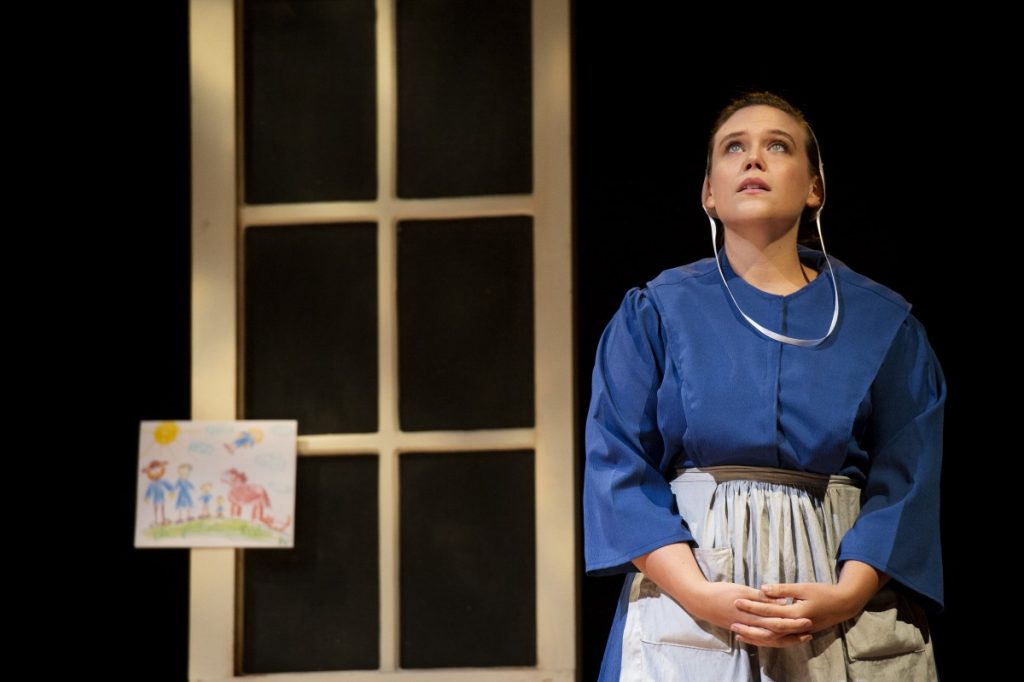
As part of Chautauqua Theater Company’s initiative this summer to spotlight communities, it looked toward the Institution’s neighbors with The Amish Project, play about communal forgiveness after an act of gun violence.
The play, loosely based on a 2006 schoolhouse shooting in Pennsylvania, ran last Sunday through Tuesday, and Chautauquans were invited to stick around Bratton Theater to discuss the play with its director and actor following each show.
After Monday’s packed 4 p.m. performance, CTC Artistic Director Andrew Borba began with a round of “popcorn,” asking those in attendance to shout out a one-word response to the play.
“Enlightening” and “powerful” came first, followed by “forgiveness,” “simmering,” “complex” and “we’re in it together.” Some expressed “pain,” “brokenness” and “guilt”; others said “innocent” and “angel.” Finally, folks added “shocking,” “funny” and “confusing” to the list.
Several attendees offered high praise of guest artist Kathryn Metzger’s versatile acting chops. Throughout the play, she embodied a range of characters, from the gunman and his widow to two of the girls in the schoolhouse.
The Amish Project premiered in 2010 at Rattlestick Playwrights Theater, where playwright Jessica Dickey performed the one-woman show. It has since been produced across the country.
Director Sarah Elizabeth Wansley said the New Play Workshop format of the CTC run was to give herself and Metzger experience working with the text. The two hope to collaborate again for a future production of the play.
Chautauquan Lynn Stahl said she saw a production of The Amish Project two years ago in San Antonio, Texas, but had trouble following along as the actor changed characters.
“We were so confused that I ordered the script,” she said. “This was 5 million times better.”
Stahl credited the production’s success to Metzger’s acting, as well to the lighting and sound cues used to signal each character.
“I love the play; I think it’s brilliant,” Stahl said. “I think it’s a very important (play) which I would love to have discussion on, on how quickly we should forgive.”
One attendee asked how the local Amish population had received the show, if they had seen it at all. (There was one bonnet in the audience, but its owner did not stay for the talkback.)
Wansley replied that CTC had asked Malinda Byler, a local Amish woman, to construct Metzger’s costume and that Byler had asked to see the play. Wansley said that Byler, along with her sisters and mother, had attended a private dress rehearsal Monday afternoon and seemed to enjoy the play, but were not keen on the strong language.
At one point in the play, a woman accosts the gunman’s widow in the grocery store, blaming her for the murders, as the gunman entered the schoolhouse with intent to molest the girls. “There’s a fresh hell where you’ll join your sicko husband,” the woman says.
Near the end of the talkback, Wansley asked if anyone in the audience felt they could forgive Eddie Stuckey, the character modeled after the real-life gunman.
A woman from Ohio said that she did not forgive him, as the character who “caused the chaos” was less compelling than the other voices on stage.
Another attendee, Daryl Yoder, stood up in the theater’s second row to say that the gunman’s struggle is
not unique.
“The idea about rage and ‘sicko’ really gets me going,” Yoder said. “We want to call them sick or mentally ill. This is called narcissism, which is not an illness; it is part of humanity, which destroys many people.”
Bob McClure, former president of Friends of Chautauqua Theater, said his popcorn word was “education.” Initially, he meant this in reference to the Amish community’s forgiveness, but realized upon leaving Bratton that the play’s lesson may have been more personal.
“I think it made me be much more introspective about things that make me mad,” McClure said. “I’m thinking about how I behave and why I react.”




